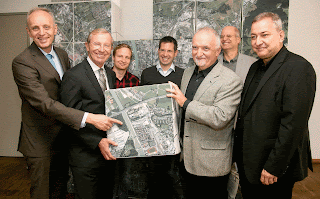The Department of Geoinformatics - Z_GIS implemented a week-long Interdisciplinary Faculty Development Workshop on 'Geospatial Applications of Satellite Generated Atmospheric and Climatic Data (clim-SAT)' at Bogor Agricultural University (IPB), Bogor, Indonesia. The workshop was organised jointly by Z_GIS and IPB from 23rd to 27th October, 2017. The clim-SAT project was co-funded by ASEA Uninet Austria.
The workshop was inaugurated by Dr. (Ms) Sri Nurdiati, Dean - Faculty of Mathematics and Natural Sciences, IPB. The session was followed by three open lectures delivered by Prof. Lilik Budi Prasetyo and Prof. I. Nengah Surati Jaya both from Faculty of Forestry, IPB; and Dr. Shahnawaz from Z_GIS which attracted about 100 attendees from within and outside the IPB.
Dr. Shahnawaz (Z_GIS) and Dr. (Ms) Imas S. Sitanggang (IPB) conducted the workshop at the Faculty of Forestry (IPB). They taught the participants about the TERRA, AQUA, TRMM and GPM satellite platforms as well as trained them in using a range of data sets generated by various sensors aboard these platforms. Focusing on an interdisciplinary approach, 25 teachers and postgraduate students from 9 universities across 4 countries (i.e. Indonesia, Malaysia, Philippines and Thailand) participated in the workshop. The trainees worked on individual projects and explored geospatial applications of various atmospheric and climatic data sets in a range of disciplines. The hands-on practical work was based on the GIS software ArcGIS Desktop, and all participants presented interesting outcomes in the concluding seminar. The workshop concluded with a visit to the Indonesian National Institute of Aeronautics and Space (LAPAN) on the last day.
Prof. Lilik Budi Prasetyo (Head, Dept. of Forestry, IPB) conferred the certificates of successful completion on the participants and congratulated them for having benefitted from this international and interdisciplinary workshop. Appreciating the high quality of the workshop, he announced that IPB has allocated 3 credits to the workload for recognising it as a part of various study programmes at IPB as well as other participating universities. He also conveyed his gratitude to Z_GIS as well as to ASEA Uninet and expressed willingness to strengthen and expand the institutional collaboration with Z_GIS.
The workshop was inaugurated by Dr. (Ms) Sri Nurdiati, Dean - Faculty of Mathematics and Natural Sciences, IPB. The session was followed by three open lectures delivered by Prof. Lilik Budi Prasetyo and Prof. I. Nengah Surati Jaya both from Faculty of Forestry, IPB; and Dr. Shahnawaz from Z_GIS which attracted about 100 attendees from within and outside the IPB.
(Attendees in the clim-SAT inaugural session)
Dr. Shahnawaz (Z_GIS) and Dr. (Ms) Imas S. Sitanggang (IPB) conducted the workshop at the Faculty of Forestry (IPB). They taught the participants about the TERRA, AQUA, TRMM and GPM satellite platforms as well as trained them in using a range of data sets generated by various sensors aboard these platforms. Focusing on an interdisciplinary approach, 25 teachers and postgraduate students from 9 universities across 4 countries (i.e. Indonesia, Malaysia, Philippines and Thailand) participated in the workshop. The trainees worked on individual projects and explored geospatial applications of various atmospheric and climatic data sets in a range of disciplines. The hands-on practical work was based on the GIS software ArcGIS Desktop, and all participants presented interesting outcomes in the concluding seminar. The workshop concluded with a visit to the Indonesian National Institute of Aeronautics and Space (LAPAN) on the last day.
(Clim-SAT Workshop Participants)
Prof. Lilik Budi Prasetyo (Head, Dept. of Forestry, IPB) conferred the certificates of successful completion on the participants and congratulated them for having benefitted from this international and interdisciplinary workshop. Appreciating the high quality of the workshop, he announced that IPB has allocated 3 credits to the workload for recognising it as a part of various study programmes at IPB as well as other participating universities. He also conveyed his gratitude to Z_GIS as well as to ASEA Uninet and expressed willingness to strengthen and expand the institutional collaboration with Z_GIS.













